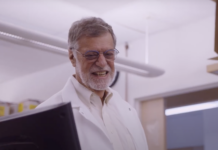Prof. Ralph DaCosta is a Principal Investigator at the Princess Margaret Cancer Centre and holds the Cancer Care Ontario Research Chair in Cancer Imaging. We asked him everything from what he likes most about being a scientist to what advice he has for young researchers in hopes of giving you a better understanding of what goes on outside the lab for one of the best minds in Canadian research.
What do you like most about being a scientist?
Discovering new things that could improve health or our understanding of disease. Sharing my love of science with everyone who will listen to me.
What do you envision in the future of your field?
Cancer imaging is an exciting and durable field. Breakthroughs and innovations in imaging technologies continue to unfold, impacting preclinical cancer research and the clinical setting (i.e. surgical guidance). The future is very bright!
How will your research make a difference in our lives?
While our long-term focus is on curing and improving the quality of life of cancer patients, we are also excited about using imaging technologies to elucidate the cellular/molecular mechanisms of cancer and discover new ways to overcome today’s barriers to treatment success. We are also interested in expanding to other areas of health care where cancer imaging technologies can be beneficial (i.e. wound care, dermatology, organ transplantation, etc.) Our focus on translating biomedical and biotechnology discoveries rapidly to the clinical domain is guided by our desire to help improve the health of patients rapidly.
What advice would you give young researchers?
Be creative, persevere, be passionate and generous with your craft and your knowledge, and believe in yourself. Look for problems to solve, then solve them one at a time – with innovation. Celebrate collaborations that work, and correct those that don’t. Create a 5 year research plan and a career path. Try to follow them, but allow for “forks in the road”. Fine tune your plans as you go. Above all, never corrupt your integrity as a scientist – once you lose it, you will not easily get it back.











































